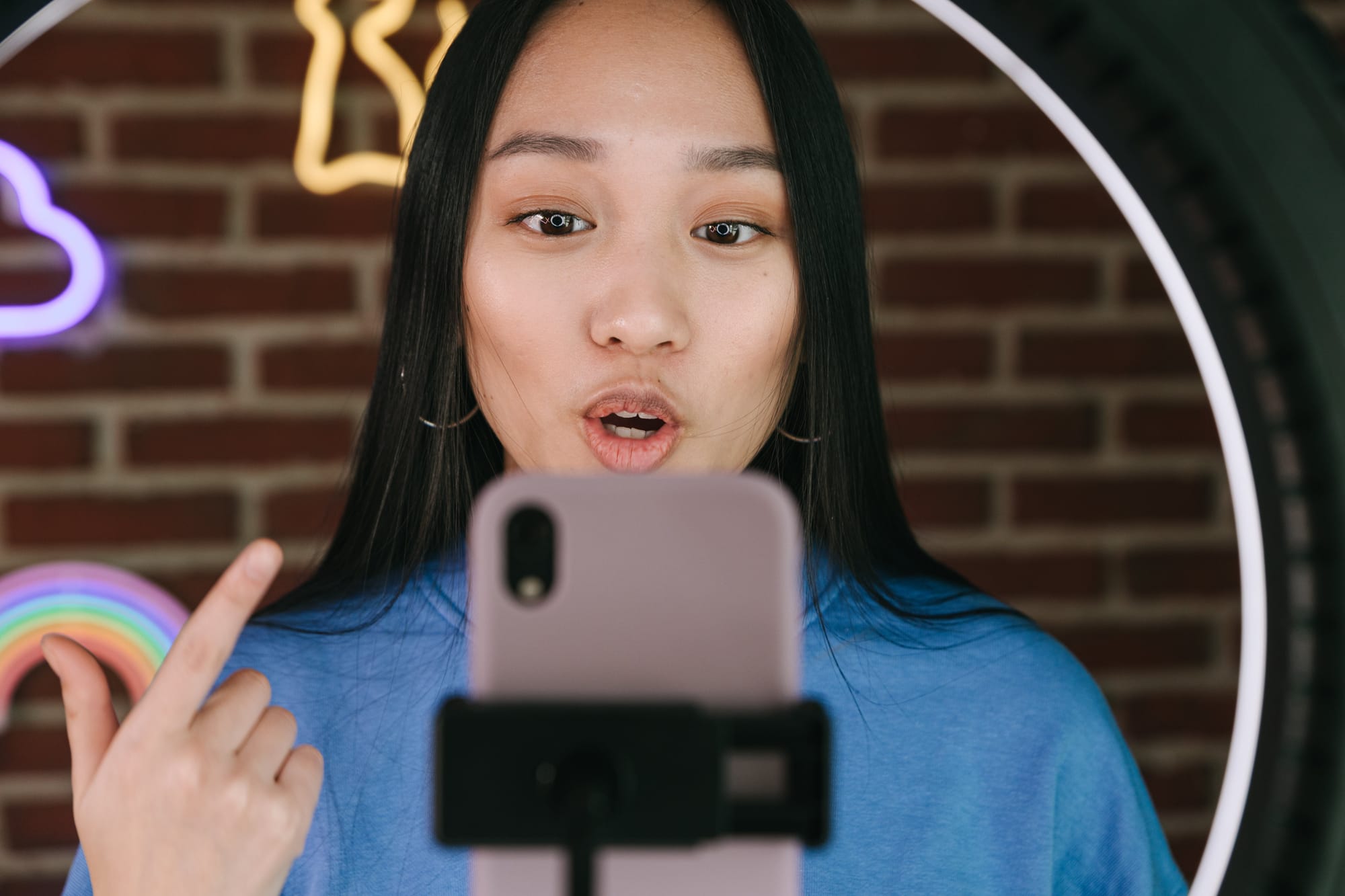Gen Z Influencer Marketing: What Marketers Should Know (2024)
Why influencer marketing is vital to your brand strategy to captivate your Gen Z audience.
Generation Z, or Gen Z, encompasses individuals born between 1997 and 2012, ranging from 12 to 27 years old in 2024. Contrasting with their predecessors, the Millennials, born from 1981 to 1996, now aged between 28 and 43, Gen Z came of age in a vastly different digital landscape.
While Millennials experienced the rise in popularity of social media with platforms like MySpace reaching a million users by 2004, Gen Z was practically born into a world where smartphones and social media were the norms. The youngest of Gen Z were greeted by the iPhone 5 upon their arrival, while Millennials didn't encounter the iPhone until their adolescence, between the ages of 11 and 26.
As more than half of Gen Z have transitioned into adulthood, they've stepped into post-secondary education and the workforce. But with their unique upbringing and digital fluency, they're reshaping consumer trends and influencing marketing brand strategy in significant ways. Here are some insights for leveraging the power of influencers to effectively market your brand to your Gen Z audience.
Who is Gen Z?
Gen Z was born into a world where modern technology, the internet, and social media are already deeply infused into their everyday lives. They don't remember a world with dial-up connections, floppy disks, or cassette tapes.
Instead, they've been able to access the internet from their smartphones, share pictures and videos with their friends over the cloud, and stream their favorite music and movies. Technology isn't just a tool that they use; it has shaped their identity.
This upbringing has given Gen Z a unique perspective and skill set. They're not just consumers of digital content; they're creators, curators, and influencers in their own right. They understand the nuances of online communities, the power of viral trends, and the importance of authenticity in a digital landscape saturated with advertising.
As marketers, understanding and embracing Gen Z's digital fluency is essential for connecting with this generation on their terms. It's not just about advertising to them; it's about engaging with them in meaningful ways that resonate with their values, interests, and online behaviors.

Socially conscious and value-driven
Gen Z is all about diversity and inclusion. They've grown up in a world where communities advocate for their rights and voice their opinions for change. For Gen Z, these values aren't just buzzwords – they're deeply ingrained principles that shape their worldview.
When it comes to marketing to Gen Z, brands need to understand just how important diversity and inclusivity are to this generation. Gen Z wants to see women-led businesses, fair representation for all types of people, and brands that champion diversity in all its forms. It's not just about the products or services you offer; it's also about how you position your brand and the values you stand for.
For Gen Z, supporting brands that align with their values is key. They're drawn to companies that support minority groups, promote gender equality, and prioritize sustainable practices. When brands demonstrate a commitment to these principles, Gen Z is more likely to engage with them and become loyal customers.
For brands looking to effectively engage with their Gen Z audience, this means partnering with influencers who reflect the diversity and inclusivity that Gen Z values. Whether it's collaborating with influencers from different backgrounds, amplifying voices that are often marginalized, or championing causes that matter to Gen Z, brands can leverage influencer partnerships to authentically connect with this generation.
Short attention spans
Gen Z is notorious for having short attention spans, thanks in part to the explosion of short-form content on social media platforms like TikTok, Instagram, YouTube, and Snapchat. Unlike previous generations who might sit through commercials during TV shows, Gen Z has grown accustomed to consuming bite-sized content that grabs their attention quickly.
For marketers, this presents a unique challenge. With only a few seconds to make an impression, capturing the attention of Gen Z requires innovative and engaging strategies. Whether it's through eye-catching visuals, compelling storytelling, or humor, brands need to hook Gen Z viewers from the get-go if they want to stand out in a sea of content.
Influencers can connect with audiences on a personal level by leveraging their platforms to create content that resonates with Gen Z. By understanding the preferences and interests of their followers, influencers can tailor their content to capture attention quickly and keep viewers engaged.
This means creating content that is visually appealing, concise, and relevant to Gen Z's interests. Whether it's a quick tutorial, a behind-the-scenes glimpse, or a funny skit, influencers should focus on delivering content that is easily digestible and leaves a lasting impression. This way, both brands and influencers can effectively engage with their Gen Z audience and create meaningful connections that drive results.

The rise of micro-influencers
While they may not boast the massive follower counts of macro-influencers, micro-influencers typically have between 10,000 and 100,000 followers who are deeply engaged with their content. What sets micro-influencers apart is their authenticity and relatable content, which resonates strongly with their loyal audience.
These influencers often occupy specific niches, catering to audiences with shared interests or passions. While their follower count may be smaller, their impact is substantial. Their followers trust their recommendations and value their opinions, leading to higher engagement rates compared to influencers with larger, more diverse audiences.
Brands should not underestimate the power of micro-influencers. Despite their smaller reach, their highly engaged audience makes them incredibly valuable for targeted marketing efforts. When micro-influencers promote products or services that align with their values, their Gen Z audience is more likely to engage with the brand, whether it's by making a purchase or recommending them to friends.
Gen Z platforms and preferences
Gen Z's favorite social platforms—TikTok, Instagram, Snapchat, and YouTube—are key players in influencer marketing. Each of these platforms offers unique opportunities for brands to connect with their Gen Z audience through creating visually engaging short-form content. Here's how brands can leverage them:
TikTok
- Strength: TikTok's strength lies in its ability to make short-form videos go viral. The platform's algorithm prioritizes engaging content, making it an ideal space for brands to capture the attention of Gen Z.
- Strategy: Brands can partner with TikTok creators who have a strong following and align with their target audience. These creators can integrate brand messages seamlessly into their content, ensuring that they resonate with viewers.
- Tip: To succeed on TikTok, brands should prioritize creativity and authenticity. Gen Z users value content that feels genuine and relatable, so focusing on creating authentic experiences is key.
- Strength: Instagram offers a variety of content formats, including photos, videos, and stories, allowing brands to showcase their products or services in diverse ways. The platform's visual-centric nature makes it perfect for engaging Gen Z users.
- Strategy: Brands can collaborate with influencers whose aesthetic and style align with their brand. These influencers can feature products in their posts or stories, providing authentic endorsements to their followers.
- Tip: Authenticity is crucial on Instagram. Brands should choose influencers who genuinely resonate with their audience to ensure that the partnership feels natural and authentic.
Snapchat
- Strength: Snapchat's ephemeral messaging and augmented reality features make it a unique platform for engaging Gen Z users. Brands can leverage these features to create interactive and immersive experiences for their audience.
- Strategy: Collaborating with influencers who are adept at using Snapchat's features can help brands create engaging branded content. This could include sponsored lenses or filters that users can interact with and share.
- Tip: Brands should focus on creating experiences that are fun and shareable. Snapchat users enjoy playful and interactive content, so brands should prioritize creating experiences that align with the platform's vibe.
YouTube
- Strength: YouTube's extensive library of video content makes it a powerhouse for influencer marketing. Brands can partner with creators to produce engaging, long-form content that resonates with Gen Z audiences.
- Strategy: Brands can work with YouTubers who create content in their niche or industry. These creators can feature products or services in their videos, providing in-depth reviews or tutorials that showcase the brand's value.
- Tip: Authenticity and value are key on YouTube. Brands should prioritize working with creators who have a genuine connection with their audience and can provide valuable insights or entertainment. By focusing on creating content that adds value to viewers' lives, brands can effectively engage Gen Z users on YouTube.

Building authentic connections
Gen Z values authenticity, so partnering with influencers whose stories naturally align with your brand is essential. Look for influencers who can seamlessly integrate your product or service into their everyday experiences, whether it's a skincare journey or embracing sustainable fashion. Authentic storytelling creates a genuine connection with Gen Z audiences.
Prioritize transparency
Transparency builds trust, especially in the digital realm. Be open about your brand's values, mission, and offerings. Encourage influencers to provide honest reviews and feedback about your products or services. When brands and influencers are transparent, it fosters credibility and authenticity among Gen Z consumers.
Collaborate on content
Collaborating with influencers on content creation is key to fostering authenticity and relatability. Give influencers the creative freedom to incorporate sponsored content into their regular posts in a way that aligns with their brand and style. This approach ensures that the content feels genuine and resonates with their Gen Z audience.
Seek relevant partnerships
Look for influencers who have an authentic connection to your target audience. Consider shared interests, values, or experiences when selecting influencers to partner with. This genuine connection ensures that your messaging feels relatable and authentic, enhancing engagement with Gen Z consumers.
Invest in long-term relationships
Building lasting relationships with influencers is crucial for sustained authenticity and trust. Nurture these partnerships over time, allowing influencers to become genuine advocates for your brand. Long-term collaborations enable influencers to seamlessly integrate your brand into their content, fostering a deeper connection with their audience.
Why influencer marketing is so important for your brand strategy
Influencer marketing isn't just another trend; it's a game-changer for businesses. When brands team up with influencers who genuinely resonate with Gen Z, magic happens. Aside from just boosting their sales, brands can forge genuine connections and become a part of their Gen Z audience's world.
Forget about traditional ads; Gen Z sees right through them. Influencer content, on the other hand, feels like a breath of fresh air in their feeds. It's authentic, relatable, and has the power to spark real conversations and drive action.
By jumping into influencer marketing, brands can't just survive; they can thrive in the digital marketing space. It's about being authentic, getting creative, and teaming up with influencers who speak the language of Gen Z to make a lasting impact and grow together.





